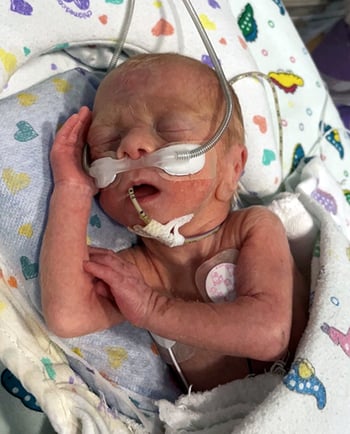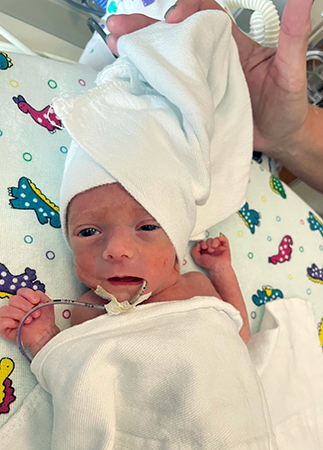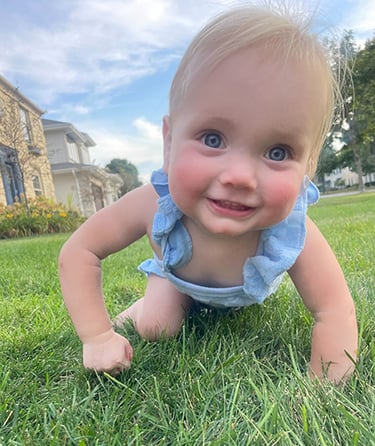
Little darlings: A new Children's Wisconsin clinic is giving the smallest babies hope
If you met Lottie Guhl, you would probably notice her big voice and sweet smile. You might see how much she adores her 3-year-old big sister, Goldie. Or, perhaps you’d hear her ask her mom and dad for bath time, one of her favorite activities. What you might not notice is how hard Lottie and her family had to work to get to where they are today.
 Alex’s pregnancy with Lottie was normal and healthy at first. But at her 20-week OB-GYN visit, Alex was diagnosed with placenta previa, a condition where the placenta covers the opening of the cervix. Alex had experienced some bleeding due to the condition, so her doctors advised her to be extra careful and remain on bed rest — quite a challenge with a 2-year-old running around at home.
Alex’s pregnancy with Lottie was normal and healthy at first. But at her 20-week OB-GYN visit, Alex was diagnosed with placenta previa, a condition where the placenta covers the opening of the cervix. Alex had experienced some bleeding due to the condition, so her doctors advised her to be extra careful and remain on bed rest — quite a challenge with a 2-year-old running around at home.
Her doctor informed her about the risks of placenta previa, including worst-case scenarios a parent never wants to hear — severe bleeding, fetal distress and preterm birth. Living a quick five minute drive from Froedtert Hospital and Children’s Wisconsin brought some comfort — and proved to be potentially life-saving.
At 28 weeks pregnant, Alex was admitted to Froedtert’s Birth Center due to a bleed. A few weeks later, on May 12, 2023, Alex began to hemorrhage at home, and an ambulance transported her back to Froedtert.
“Everything happened so fast,” said Alex. “We didn’t even grasp the fact our baby was going to be delivered three months early.”
A place to call home
 Once she arrived at Froedtert, Alex was rushed to the operating room for an emergency C-section. As soon as Lottie was born, at just 2 lbs. 4 oz., she needed breathing support for a deflated lung. Despite all the chaos, stress and unknowns, Lottie’s dad, Dan, remembers feeling confident in Lottie’s care team.
Once she arrived at Froedtert, Alex was rushed to the operating room for an emergency C-section. As soon as Lottie was born, at just 2 lbs. 4 oz., she needed breathing support for a deflated lung. Despite all the chaos, stress and unknowns, Lottie’s dad, Dan, remembers feeling confident in Lottie’s care team.
“I knew Lottie was in the right place,” he said, “which helped put my mind at ease.”
The next morning, Alex met and touched little Lottie for the first time when she was wheeled down the hallway to the Children’s Wisconsin NICU, the state’s largest level IV NICU (the highest level available).
In the NICU, Lottie was placed on oxygen and required a feeding tube. She needed to learn to suck, swallow, feed and breathe on her own.
“When your child is in the hospital, it throws your life into chaos,” said Dan. “Children’s Wisconsin provides such a safe, stable and nurturing environment and gives kids a fighting chance.”
Lottie’s journey was far from linear: There was a period when she didn’t gain weight, and a few times she had to return to oxygen after being weaned off. But through all the ups and downs, the Children’s Wisconsin team made sure the whole family was taken care of.
Naturally, Alex and Dan were afraid. Their baby was tiny, so tasks like diaper changes and feeding felt more intimidating. Children’s Wisconsin nurses walked them through the process, with the goal of helping them bond with Lottie and empowering them to eventually care for her at home.
“As nurses, we’re not the ones taking the baby home,” said Mary Davis, RN, a Children’s Wisconsin nurse who worked with Lottie and her family. “I would be with them every step of the way until they became more confident in taking care of Lottie. Sometimes I would just stand there because they were afraid, and my presence made them more comfortable.”
Aware of Lottie’s medical vulnerability and the big responsibility it would become for her parents, Susan Cohen, MD, one of Lottie’s neonatologists, adopted a similar approach.
“Kids in the NICU are really more complex than other kids who go home, and that can be stressful,” said Dr. Cohen. “We want to ease that stress, making sure people feel confident being their child’s parents.”
Because of Lottie’s fragile state, she had many medical providers caring for her, which can sometimes be overwhelming for parents. Lottie’s neonatologists, resident physicians and nurses always prioritized sitting down together with Lottie’s family during rounds to familiarize them with the care team and answer any questions they had. Dr. Cohen recalls sitting on the couch chatting with Alex and Dan.
“We weren’t huddled around the door, but huddled around Lottie,” said Dr. Cohen. “Taking those extra minutes was an investment in the family.”
“This was the hardest thing we have ever had to do so far in life,” said Alex. “If it wasn’t for Children’s Wisconsin, I don’t think we would have slept at night leaving her there.”
Lottie’s NICU graduation
 Lottie was discharged on July 14, nine weeks after she was born and 2 weeks before her original due date. Lottie will continue to see Dr. Cohen for visits every six months to one year at the Children’s Wisconsin HOPE (Healthy Outcomes Post-ICU Engagement) Clinic until she turns 2.
Lottie was discharged on July 14, nine weeks after she was born and 2 weeks before her original due date. Lottie will continue to see Dr. Cohen for visits every six months to one year at the Children’s Wisconsin HOPE (Healthy Outcomes Post-ICU Engagement) Clinic until she turns 2.
HOPE, founded in 2019 as one of the only clinics of its kind in Wisconsin, is a natural extension of the ICU. It provides developmental follow-up for babies who need special care after birth and are at risk for developmental delays or have ongoing medical problems.
“We built this around the premise that it doesn’t end when they discharge from the NICU,” said Dr. Cohen, who is also a professor of neonatology at The Medical College of Wisconsin, the academic partner of Children’s Wisconsin. “This is a care continuum that extends well into childhood.”
These visits focus on healthy development for NICU babies, identifying infants who would benefit from audiology, nutrition, physical and occupational therapy, psychology and social work, and speech pathology. But the providers also take time to support parents in what matters most to them, whether concerns about their baby’s sleep or feeding. Going home with a NICU baby can be scary, and it’s important parents leave their appointments with answers to their questions and comfort for their anxieties.
“What matters most to the family is what we want to address,” said Dr. Cohen, “even if there are other medical things they want to discuss.”
While caring for a NICU-graduate baby presents its challenges, Lottie, now nearly 18 months old, adds so much joy to Alex and Dan’s family. Their experience at Children’s Wisconsin left them feeling equipped to care for their growing Lottie, both medically and emotionally.
“Children’s Wisconsin is such a community. We trusted them implicitly,” said Alex. “They not only had our child’s best interest at heart, but our entire family’s. They take care of everybody.”
Children's Wisconsin Resources

Written by
Ashley Abramson
Writer
Related Stories
No related articles found.



